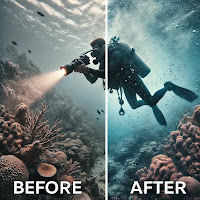Noise Reduction vs. Sharpness: Finding the Balance in Murky Waters

An AI-generated image that illustrates the use of Adobe Lightroom tools to find the balance between Noise Reduction and Sharpness. If you've ever taken underwater photos in murky conditions, you know the challenge: your images are often riddled with noise, yet reducing it too much can rob them of their sharpness. With its latest AI-powered tools, finding the right balance is an art that Adobe Lightroom helps us master. In this guide, I’ll walk you through how to strike the perfect balance between noise reduction and sharpness using five real-world underwater scenarios. Why Does Noise vs. Sharpness Matter? High ISO settings are often necessary when shooting in challenging conditions, such as low-light environments or murky waters, particularly underwater photography. However, while these settings can help capture the scene, they frequently introduce noise, manifesting as unwanted graininess that can detract from the overall image quality. To address this issue, photographers oft...


